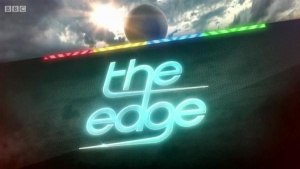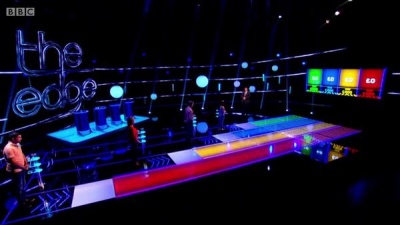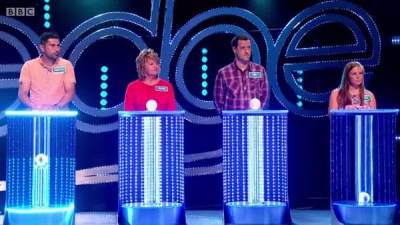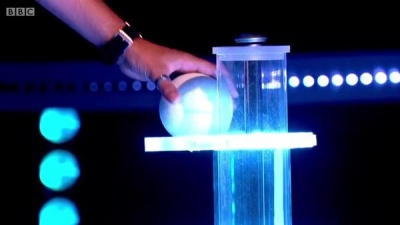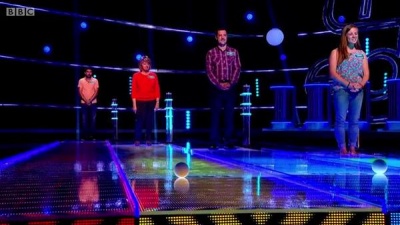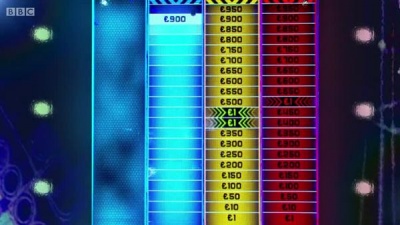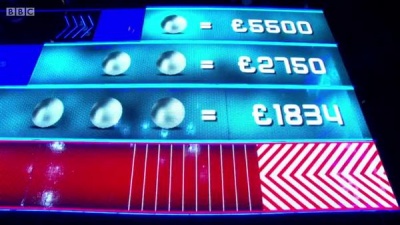The Edge
(→Broadcast) |
(→Synopsis) |
||
| (20 intermediate revisions not shown) | |||
| Line 1: | Line 1: | ||
| - | [[File:The edge title.jpg|300px]] | + | <div class="image">[[File:The edge title.jpg|300px]]</div> |
<div class="box"> | <div class="box"> | ||
| Line 5: | Line 5: | ||
== Host == | == Host == | ||
| - | Series 1: Mark Benton | + | Series 1: [[Mark Benton]] |
Series 2: [[Gabby Logan]] | Series 2: [[Gabby Logan]] | ||
| + | |||
| + | == Co-host == | ||
| + | |||
| + | Commentator: David Corkill (series 2 only) | ||
== Broadcast == | == Broadcast == | ||
| Line 19: | Line 23: | ||
Quiz show combining general knowledge and bowling. | Quiz show combining general knowledge and bowling. | ||
| - | + | <div class=image>[[File:The edge mark benton.jpg|400px]]''Series 1 host, [[Mark Benton]].''</div> | |
| - | + | All the action takes place on a set lit in the BBC daytime colours of black and black. On the floor are four narrow bowling lanes of different lengths - coloured green, blue, yellow and red in increasing order of length - and behind these lanes are four podiums. | |
| - | + | <div class=image>[[File:The edge studio wide shot.jpg|400px|The Edge]]''The set.''</div> | |
| - | + | At the start of the game, four contestants stand behind these podiums, each with a ball at the bottom. They're asked simple general knowledge questions on the buzzer, with a correct answer moving that contestant's ball up their podium (no laughing, now). The first contestant to give four correct answers, and thus get their ball to the top of their podium, gets to choose which of the four lanes to bowl on. The other contestant's podiums are then reset, and the whole process is repeated twice more, until the last contestant has only one lane to choose from. | |
| - | + | ||
| - | '' | + | |
| - | + | ||
| - | The | + | <div class=image>[[File:The edge podiums.jpg|400px]]''The heat is on, the time is r... oh, balls.''</div> |
| - | + | Eventually, it's time to bowl. Though the lanes are of different lengths, each ends with the same series of cash zones and the titular Edge. The cash zones start at £1, followed by £10, £50, and all the increments of £50 up to £950, while the Edge is worth £1000. The lanes are separated by rails, so that balls cannot stray into neighbouring lanes. They can, however, still roll off the Edge - in which case no money is earned. | |
| - | <div class=image> | + | <div class=image>[[File:The edge pick a ball.jpg|400px]]''Contestant picks up ball = Cue flash white lights and dramatic tension music.''</div> |
| - | [[File:The edge | + | |
| - | '' | + | |
| - | </div> | + | |
| - | + | The four contestants bowl one ball each. Though they've chosen their lanes, the order in which they bowl is in increasing length of lane, with the contestant on the green lane going first. The contestant with the first choice of lane, therefore, may pick a longer lane so they know the target they're aiming for. | |
| - | + | <div class=image>[[File:The edge bowling.jpg|400px]]''Rollin', rollin', rollin'...''</div> | |
| - | + | Whoever bowls the least amount of money leaves the show with nothing. If there's a tie, there's a one-ball bowl-off, closest to the Edge without going over wins. Afterwards, the shortest green lane is closed off for the remainder of the game. | |
| - | + | ||
| - | '' | + | |
| - | + | ||
| - | + | <div class=image>[[File:The edge ball on the edge.jpg|400px]]''Teetering and teetering.''</div> | |
| - | + | The three remaining contestants face another round of buzzer questions. This time, each question has a two-part answer, with both parts required to move your ball up (stop tittering). Again, first to four correct gets the first choice of lane, the other contestants' podiums are reset, and the whole process is repeated. | |
| - | <div class=image> | + | Second time at the lanes, each contestant bowls two balls, again in order of increasing length of lane. The cash zones remain the same, but the Edge is now worth £2000. The first contestant to qualify gets a standard lane, but the second contestant must face one randomly-assigned "danger zone" - which replaces one of the cash zones with £1 - and the third contestant must face two "danger zones". Whoever bowls the lowest combined amount is off the show empty-handed (regardless of what they bowled in the first round), and the blue lane is closed off. |
| - | [[File:The edge | + | |
| - | '' | + | <div class=image>[[File:The edge danger zones.jpg|400px|The Edge]]''A danger hole in the yellow lane.''</div> |
| - | </div> | + | |
| + | The two remaining contestants face yet another round of buzzer questions, now with three-part answers. First to four not only gets to choose either the yellow or red lane, but also gets to place one "danger zone" on their opponent's lane. Each contestant bowls three balls, with the Edge now worth £3000. Whoever bowls the lower combined amount goes home penniless, the yellow lane is closed off, and the last remaining contestant goes through to the final with all the money they've accumulated. | ||
| + | |||
| + | In the final, the contestant must land a ball on the longest red lane's Edge to win some, or all, of their money. First, they face one last round of questions, with four-part answers, lasting 75 seconds. Each question correctly answered extends the Edge by the length of two cash zones. Afterwards, the contestant must decide how many balls they want: one ball to win all their cash, two for half the amount, or three for a third. If they succeed in landing on the Edge in fewer balls than they decided on, they win only the proportion corresponding to their decision (e.g. if they decide on two balls and succeed in one, they win only half the amount). If all their balls fail to land on the Edge - whether coming up short or rolling off - they leave with nothing. | ||
| + | |||
| + | <div class=image>[[File:The edge final gamble.jpg|400px|The Edge]]''A long Edge, a tricky decision.''</div> | ||
Viewers had a number of problems. The "danger zones" subtracted from the spectacle, and the final used just one of many ways to make the game easier. Mostly, there was too much quiz and not enough bowling. Resetting the scores to zero smacked of padding the programme to fill a slot. | Viewers had a number of problems. The "danger zones" subtracted from the spectacle, and the final used just one of many ways to make the game easier. Mostly, there was too much quiz and not enough bowling. Resetting the scores to zero smacked of padding the programme to fill a slot. | ||
| + | |||
| + | The second series mixed things up a bit, though not enough to rescue the format. Out went the interminable wait for everybody to qualify and in came players bowling as soon as they qualified - hooray! But the substitution of Gabby Logan for Mark Benton didn't really make a lot of difference, and the addition of actual bowls commentator David "Corky" Corkill seemed like a good idea but he only had about five seconds to say something, and there weren't really any variables for him to talk about, so what was the point? A far better tweak would have been to cut the filler and bring the show down to a pacey 30 minutes, but BBC daytime just doesn't operate on that basis. | ||
== Catchphrases == | == Catchphrases == | ||
| Line 69: | Line 71: | ||
Jamie Ingley and Mark Espley, developed by Leon Wilde and BBC Entertainment London team | Jamie Ingley and Mark Espley, developed by Leon Wilde and BBC Entertainment London team | ||
| - | == Theme | + | == Theme music == |
| - | Marc Sylvan | + | A full score was written by Marc Sylvan. |
== Trivia == | == Trivia == | ||
| Line 79: | Line 81: | ||
== External links == | == External links == | ||
| - | [http://www.bbc.co.uk/programmes/b06jp0s3 | + | [http://www.bbc.co.uk/programmes/b06jp0s3 BBC programme page] |
[http://en.wikipedia.org/wiki/The_Edge_(game_show) Wikipedia entry] | [http://en.wikipedia.org/wiki/The_Edge_(game_show) Wikipedia entry] | ||
| Line 86: | Line 88: | ||
[http://www.fifty50show.com/?p=317 Fifty 50 discussion] | [http://www.fifty50show.com/?p=317 Fifty 50 discussion] | ||
| + | |||
| + | [http://www.ravensbourne.ac.uk/bbc-motion-graphics-archive/edge-2015 Opening titles from the BBC Motion Graphics Archive] | ||
== See also == | == See also == | ||
Current revision as of 13:55, 12 April 2024
Contents |
Host
Series 1: Mark Benton
Series 2: Gabby Logan
Co-host
Commentator: David Corkill (series 2 only)
Broadcast
BBC One, 16 March to 13 November 2015 (50 episodes in 2 series)
Synopsis
Quiz show combining general knowledge and bowling.
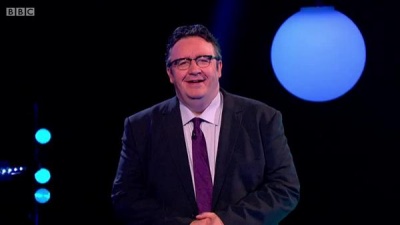 Series 1 host, Mark Benton.
Series 1 host, Mark Benton.All the action takes place on a set lit in the BBC daytime colours of black and black. On the floor are four narrow bowling lanes of different lengths - coloured green, blue, yellow and red in increasing order of length - and behind these lanes are four podiums.
At the start of the game, four contestants stand behind these podiums, each with a ball at the bottom. They're asked simple general knowledge questions on the buzzer, with a correct answer moving that contestant's ball up their podium (no laughing, now). The first contestant to give four correct answers, and thus get their ball to the top of their podium, gets to choose which of the four lanes to bowl on. The other contestant's podiums are then reset, and the whole process is repeated twice more, until the last contestant has only one lane to choose from.
Eventually, it's time to bowl. Though the lanes are of different lengths, each ends with the same series of cash zones and the titular Edge. The cash zones start at £1, followed by £10, £50, and all the increments of £50 up to £950, while the Edge is worth £1000. The lanes are separated by rails, so that balls cannot stray into neighbouring lanes. They can, however, still roll off the Edge - in which case no money is earned.
The four contestants bowl one ball each. Though they've chosen their lanes, the order in which they bowl is in increasing length of lane, with the contestant on the green lane going first. The contestant with the first choice of lane, therefore, may pick a longer lane so they know the target they're aiming for.
Whoever bowls the least amount of money leaves the show with nothing. If there's a tie, there's a one-ball bowl-off, closest to the Edge without going over wins. Afterwards, the shortest green lane is closed off for the remainder of the game.
The three remaining contestants face another round of buzzer questions. This time, each question has a two-part answer, with both parts required to move your ball up (stop tittering). Again, first to four correct gets the first choice of lane, the other contestants' podiums are reset, and the whole process is repeated.
Second time at the lanes, each contestant bowls two balls, again in order of increasing length of lane. The cash zones remain the same, but the Edge is now worth £2000. The first contestant to qualify gets a standard lane, but the second contestant must face one randomly-assigned "danger zone" - which replaces one of the cash zones with £1 - and the third contestant must face two "danger zones". Whoever bowls the lowest combined amount is off the show empty-handed (regardless of what they bowled in the first round), and the blue lane is closed off.
The two remaining contestants face yet another round of buzzer questions, now with three-part answers. First to four not only gets to choose either the yellow or red lane, but also gets to place one "danger zone" on their opponent's lane. Each contestant bowls three balls, with the Edge now worth £3000. Whoever bowls the lower combined amount goes home penniless, the yellow lane is closed off, and the last remaining contestant goes through to the final with all the money they've accumulated.
In the final, the contestant must land a ball on the longest red lane's Edge to win some, or all, of their money. First, they face one last round of questions, with four-part answers, lasting 75 seconds. Each question correctly answered extends the Edge by the length of two cash zones. Afterwards, the contestant must decide how many balls they want: one ball to win all their cash, two for half the amount, or three for a third. If they succeed in landing on the Edge in fewer balls than they decided on, they win only the proportion corresponding to their decision (e.g. if they decide on two balls and succeed in one, they win only half the amount). If all their balls fail to land on the Edge - whether coming up short or rolling off - they leave with nothing.
Viewers had a number of problems. The "danger zones" subtracted from the spectacle, and the final used just one of many ways to make the game easier. Mostly, there was too much quiz and not enough bowling. Resetting the scores to zero smacked of padding the programme to fill a slot.
The second series mixed things up a bit, though not enough to rescue the format. Out went the interminable wait for everybody to qualify and in came players bowling as soon as they qualified - hooray! But the substitution of Gabby Logan for Mark Benton didn't really make a lot of difference, and the addition of actual bowls commentator David "Corky" Corkill seemed like a good idea but he only had about five seconds to say something, and there weren't really any variables for him to talk about, so what was the point? A far better tweak would have been to cut the filler and bring the show down to a pacey 30 minutes, but BBC daytime just doesn't operate on that basis.
Catchphrases
"The game show with brains — and balls!"
"Let's roll!", said before every single bowl.
Inventors
Jamie Ingley and Mark Espley, developed by Leon Wilde and BBC Entertainment London team
Theme music
A full score was written by Marc Sylvan.
Trivia
Before the recording starts, players are allowed some practice rolls, so they can gauge the strength they need to overcome friction in the playing surface.
External links
Show discussion and recording report from Bother's Bar.
Opening titles from the BBC Motion Graphics Archive
See also
Quiz Bowl, a quiz show based on American football.

